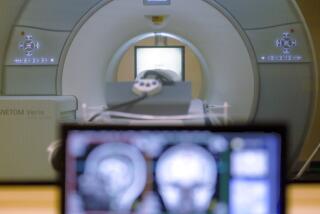Searching for truth and treatment
MEDICINE is a delicate balance between art and science; between intuition about a single human being and broad understanding of the disease process in humans; between what is known and what can reasonably be hoped for.
In these respects, few diseases are worse than cancer. People are often shocked to find that when they need answers from medicine the most, they get guesses and uncertainty. They confront physician egos and arrogance as the clock ticks and they feel their time running out.
David Newman saw it all as he sought treatment for a rare and life-threatening brain tumor, discovered in 1999. He writes about it in “Talking With Doctors,” a memoir of his struggle to understand exactly what was wrong with him and what to do about it.
As his story unfolds, the reader is comforted in knowing that he must have made it through, because he lived to write about it.
But the book is no less riveting. For page after page, the reader is aboard the hellish roller coaster of cancer treatment. His tumor dominates the book as it does his life. “For a time, even an extended time, a malignant growth in the center of one’s skull is entirely usurping -- it overwhelms and obliterates, permits virtually nothing else to exist.” We read on, empathically locked into his plight and as impatient as he is to hear what the doctors will propose.
But the doctors are unsure. Uncertainty for doctors is an uncomfortable realm. As a psychotherapist, Newman notices eye contact or lack of it, the phrasing of sentences that distances one physician, humanizes another. He heard both that his tumor was inoperable and that surgery might work. He heard skepticism about any nonsurgical treatment. He was told to get his affairs in order.
Through it all, the doctors he encounters prove themselves human. He has an angry encounter with a doctor who learns Newman is leaning toward surgery with a physician in another city, another hospital. “He will operate on anyone who lets him,” a New York surgeon says dismissively of a respected Boston surgeon. (Newman changed the names of all the doctors.)
Yet, after consultations with top oncologists, surgeons and radiologists at four major medical centers, it is the Boston surgeon who inspires trust. “It was his impression that the tumor was of a kind that could be extracted in its entirety. If he encountered problems that posed too great a risk, he would proceed no further.” Like all the other options, the course offered no guarantee.
Newman proceeded, knowing full well that surgery could result in blindness or stroke -- even death. Settling on a physician and a treatment plan was a well-researched and highly personal choice. It wasn’t science alone, because science offered no guarantees. It wasn’t personality alone, because Newman is too smart to disregard competence and the best, however limited, medical evidence he could find. After all his research, Newman knew he had found his doctor. “After only 20 minutes (I had glanced down at my watch) I felt convinced of Dr. Neria’s expertise and skill. His behavior was not notable for its warmth or personal visibility, but neither was he brusque or impatient. He had been respectful and thorough, as well as playful at times, and he seemed to appreciate the benefit of an actively engaged patient.”
Newman is a psychoanalyst trained in social work, not a doctor. He writes of the difficulty that even a confident, educated man can have in talking with doctors. He confronted egos, condescension, excuses -- even lies. He ran into odd forms of compassion, such as the physician who instructed his receptionist to return Newman’s $10 co-payment, as though the gesture would help compensate a man who just learned he might die soon.
He also found doctors who asked about his family, who walked him to the cab stand when he appeared too shaky to move, who followed through with phone calls to get test results more quickly.
From all of them, no matter how much he may have wished for a miracle, he never expected one. He wanted only a full version of truth that he could understand. “In my talking with doctors I was not looking for Shangri-La. Nor was I just like Pooh tracking a woozle. In those life-and-death dialogues, I was looking for a way of ascertaining real tracks, of finding out what could be reasonably discerned. I was seeking to identify the contours of what I was faced with.”
For Newman or any patient, the final choice for treatment when disease is severe is a massive leap of faith. “It was no longer a matter of my will. I was putting my life in someone else’s hands.” His surgery was successful, as was his radiation follow-up. For five years, he has had no sign of cancer recurrence.
He lived to smile on a book jacket.
More to Read
Sign up for our Book Club newsletter
Get the latest news, events and more from the Los Angeles Times Book Club, and help us get L.A. reading and talking.
You may occasionally receive promotional content from the Los Angeles Times.







